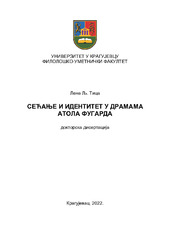Приказ основних података о дисертацији
Sećanje i identitet u dramama Atola Fugarda
Memory and identity in Athol Fugard's plays
| dc.contributor.advisor | Vlašković Ilić, Biljana | |
| dc.contributor.other | Kaličanin, Milena | |
| dc.contributor.other | Teodorović, Jasmina | |
| dc.contributor.other | Matović, Tijana | |
| dc.creator | Tica, Lena | |
| dc.date.accessioned | 2022-12-03T09:50:31Z | |
| dc.date.available | 2022-12-03T09:50:31Z | |
| dc.date.issued | 2022-08-30 | |
| dc.identifier.uri | http://eteze.kg.ac.rs/application/showtheses?thesesId=8573 | |
| dc.identifier.uri | https://fedorakg.kg.ac.rs/fedora/get/o:1528/bdef:Content/download | |
| dc.identifier.uri | https://nardus.mpn.gov.rs/handle/123456789/20994 | |
| dc.description.abstract | U disertaciji se na korpusu od petnaest drama Atola Fugarda ispituju načini na koje su identitetske konstrukcije dramskih subjekata uslovljene traumatičnim sećanjima, pri čemu se i sećanje i identitet posmatraju u individualnim i kolektivnim ravnima. U teorijskom delu disertacije koncipiran je interdisciplinarni okvir koji postmoderno, psihoanalitičko i postkolonijalno poimanje identiteta dovodi u spregu sa studijama sećanja i traume. Primena predloženog okvira u analitičkom delu disertacije vodi do zaključka o neodrživosti koncepcije odredljivog i samodovoljnog identiteta Fugardovih protagonista, ali i njega samog kao jednog od likova, s obzirom na to da sećanjem upravljaju subjektivne i ideološki uslovljene percepcije koje sprečavaju likove da osmisle svoju naizgled besmislenu traumatičnu prošlost. Ta prošlost je odraz kako konkretne istorijske traume aparthejda tako i Lakanovog traumatičnog realnog koje za likove ostaje neuhvatljivo, usled njihove večite simboličke uslovljenosti. Dijaloška struktura drama kod Fugarda odgovara prikazu likova čiji se identitet uspostavlja kao neodvojiv od postojanja drugog, bilo na unutrašnjem ili spoljašnjem nivou sopstva, kao i postupku svedočenja, putem koga protagonisti predstavljaju i prihvataju traumatično iskustvo, pri čemu se stvaraju nove identitetske pozicije i svedoka traume (Ja) i svedoka svedoku (drugog). S obzirom na ideološki kontekst, odnos Ja i drugog u dramama se posmatra u smislu odnosa nadređenog Drugog i podređenog drugog, kao spoljašnjih identitetskih pozicija koje nameće vladajući sistem. Naglašavanjem njihove konstantne smene tokom drama, kao i primenom dekonstruktivističke kritike i koncepata hibridnosti i mimikrije ukazuje se na artificijelnu prirodu i nepostojanost ovih pozicija čime se dovodi u pitanje i sam ideološki okvir u kome se sopstvo kao takvo konstituiše. | sr |
| dc.description.abstract | This dissertation aims to analyse how the constructions of identity of Athol Fugard’s protagonists, set forth in his fifteen plays, are conditioned by traumatic memories, whereby the concepts of memory and identity are addressed on both individual and collective levels. The theoretical part of the dissertation introduces an interdisciplinary framework that establishes the relation between the postmodern, psychoanalytic and postcolonial ideas of identity and the theories of memory and trauma. The application of the proposed framework in the analytical part of the dissertation suggests the unsustainability of definable and self- sufficient identities of Fugard's protagonists, along with his own identity featuring in autobiografical plays, given that memory is governed by subjective and ideologically conditioned perceptions of the past. The past is a reflection of both the historical trauma of apartheid and Lacan's traumatic Real, which remains elusive for the characters due to their eternal symbolic conditioning. Fugard's dramatic structure, typically relying on two characters, corresponds to the depiction of the identities as inseparable from the existence of other, either internally or externally, as well as to the process of testimony, through which the protagonists present and, presumably, accept their traumatic experience. Given the ideological context, the relation between the Self and the other in the plays is observed as the one between the superior Other and subordinate other, perceived as external identity labels imposed by the ruling system. An emphasis on their constant interchange in the plays, as well as the application of the concepts of deconstruction, hybridity and mimicry, points to the artificial nature and instability of the positions, which challenges the ideological framework in which the self is constructed. | en |
| dc.format | application/pdf | |
| dc.language | sr | |
| dc.publisher | Универзитет у Крагујевцу, Филолошко-уметнички факултет | sr |
| dc.rights | openAccess | en |
| dc.source | Универзитет у Крагујевцу | sr |
| dc.subject | Atol Fugard | sr |
| dc.subject | Key words: Athol Fugard | en |
| dc.subject | drama | sr |
| dc.subject | identitet | sr |
| dc.subject | sećanje | sr |
| dc.subject | trauma | sr |
| dc.subject | sopstvo | sr |
| dc.subject | D/drugi | sr |
| dc.subject | postkolonijalizam | sr |
| dc.subject | postmodernizam | sr |
| dc.subject | psihoanaliza | sr |
| dc.subject | play | en |
| dc.subject | identity | en |
| dc.subject | memory | en |
| dc.subject | trauma | en |
| dc.subject | Self | en |
| dc.subject | O/other | en |
| dc.subject | postcolonialism | en |
| dc.subject | postmodernism | en |
| dc.subject | psychoanalysis | en |
| dc.title | Sećanje i identitet u dramama Atola Fugarda | sr |
| dc.title.alternative | Memory and identity in Athol Fugard's plays | en |
| dc.type | doctoralThesis | |
| dc.identifier.fulltext | http://nardus.mpn.gov.rs/bitstream/id/147709/Lena_Tica_FILUM.pdf | |
| dc.identifier.fulltext | http://nardus.mpn.gov.rs/bitstream/id/147708/Doctoral_thesis_12791.pdf | |
| dc.identifier.rcub | https://hdl.handle.net/21.15107/rcub_nardus_20994 |



